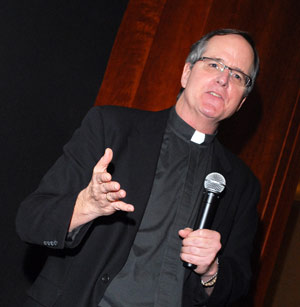
Photo by Ken Levinson
Non-biblical poetry, such as the work of Gerard Manley Hopkins, can offer readers a transformative spiritual experience, according to a scholar who spoke at Fordham on Oct. 20.
Francis X. McAloon, S.J., associate professor of Christian spirituality at the Jesuit School of Theology of Santa Clara University and Fordham’s Loyola Chair for the fall 2010 semester, discussed Hopkins’ work and how literary and religious scholarship supports a spiritual practice within his poetry.
Hopkins’ poems of consolation, such as “Pied Beauty” and “As kingfishers catch fire,” Father McAloon said, are representative of poetry throughout the Christian millennia that celebrate much of what is revered in the Psalms.
“God, God’s love, God’s creation, our participation in that creation, our status as loved creation and our celebration and participation in the celebration, love, care of this creation,” Father McAloon said.
“I’m not saying Gerard Manley Hopkins necessarily was experiencing these deep levels of consolation while he was writing this poetry, although one could make an interesting argument along those lines, but it’s just really that we have access to these poems for our own prayer in the same way tradition invites us to pray with the poetry of the scriptures,” he said.
The title of Father McAloon’s lecture, “Let Him Easter in Us,” comes from the final stanza of Hopkins’ poem, “The Wreck of the Deutschland.”
“Hopkins loved to play with words, their meanings and usages. Here he uses the word ‘easter’ in a way most of us are not familiar with. He’s turning it into a very active verb, an explosive, empowering verb,” Father McAloon said.
“‘Let Him Easter in Us,’ challenges us to the live ‘the real’ in light of an ongoing eruption of the presence and action of God in ourselves, in our relationships and in our world.”
Father McAloon proposed an interdisciplinary approach, informed by literary and religious scholarship, that allows for certain poems to function as texts for transformative prayer.
He then read from “Pied Beauty,” a shortened sonnet Hopkins wrote in 1877 while he was studying theology in Wales.
“What he is doing is offering us a sense of what it is he is glorifying God for,” Father McAloon said of the 11-line poem.
“It’s very clear that a primary site for his experience with God is in nature,” Father McAloon said. “I propose that this is a classic example of a poem that could be prayed with while one is in spiritual consolation. This is the kind of poem that can come to mind and give expression to what we’re feeling.
“Part of what poetry does for us is give us words, phrases and images to express what we feel but perhaps cannot say because we’re not poets and we don’t have that same skill or technique,” he added.
Another Hopkins poem, “As kingfishers catch fire,” would reach out to us today, Father McAloon said.
“If you spend some time with this and think about your own experience of nature and of your own sense of Christ, faith, hope and love, it is—in its own way—an incredibly consoling claim or invitation to know ourselves, not simply as sinners, but to know ourselves as loved sinners and those who are called to live Christ-like lives,” said Father McAloon, who added that most of his work on Hopkins until very recently focused on his sonnets of despair.
“Maybe it’s because I have deep, dark, Irish roots, but they always appealed to me and so it’s where I did most of my work as a graduate student and then the first 10 years of teaching,” he said. “Now I’ve decided to spend a little time on the consolation side of the spectrum.”
